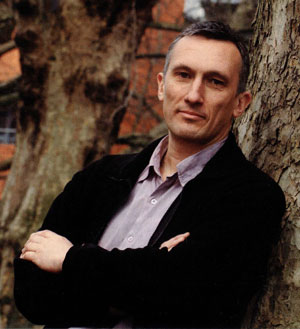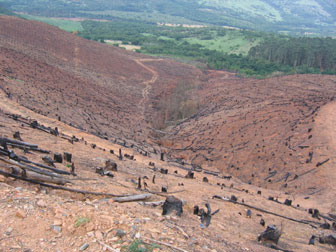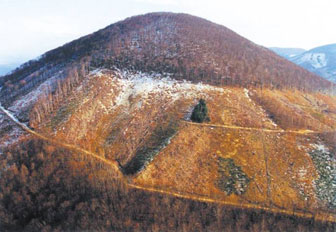 An interview with Simon Counsell, Director of Rainforest Foundation UK:
An interview with Simon Counsell, Director of Rainforest Foundation UK:The FSC is the 'Enron of forestry' says rainforest activist
Jeremy Hance, mongabay.com
April 17, 2008
On April 7th, Mongabay printed an interview with FSC International Communications Manager, Nina Haase, in which she defended the FSC against criticism leveled at it by various environmental organizations, such as The World Rainforest Movement and Ecological Internet. The interview drew strong reactions on both sides, and Simon Counsell, director of the Rainforest Foundation UK, requested a chance to respond to the FSC's interview in-depth. In his response, he states that the FSC has created a "'race to the bottom' of certification standards", alleging that the "FSC really has become the 'Enron of forestry'".
Simon Counsell responds to an interview from the forest certification group. FSC interview
Counsell, a Founder Member of the FSC, has been monitoring the organization since its creation in 1993. The problems with the FSC are not new says Counsell: "Not long into the FSC's existence, we started to hear worrying reports... In some cases, certificates were being issued to companies that had a very poor environmental and social record. In 2000, we commissioned a series of local and international experts to investigate and write up a series of case studies about such problems from a number of countries. The results were alarming, and we realised that these were not just isolated cases of 'bad' certificates, but the result of systemic problems within the FSC."
Counsell believes that many of the FSC's drawbacks are due to its tendency to look at each individual logging operation as a separate entity while ignoring the big picture of what industrial logging is doing to rainforest ecology. "Whilst a logging concession might appear to be 'sustainable' at this small-scale level, the whole development model that accompanies industrial logging concessions might be highly non-sustainable and destructive," Counsell says. He continues with examples from the Amazon and Indonesia: "Research in the Amazon has shown that, over a period of years, commercial logging greatly increases the overall propensity of the forest to dry out, burn, and disappear. This happens regardless of whether the logged areas are certified or not. In Indonesia, local environmentalists and indigenous rights experts have long said that it is no use just certifying the odd 'exemplar' logging company here and there, because the whole system of industrial logging concessions needs dismantling, and that most of the forest should be returned to its rightful owners, the indigenous communities."
Another problem that Counsell sees as detrimental to the credibility of the FSC is their certification of products from 'mixed sources', which "allows up to 90% of the wood fibre in some FSC-labeled products to come from forests or plantations that are not actually FSC-certified, but are supposedly 'controlled sources'. The truth is that these sources are not 'controlled' at all - and hence many FSC products are likely to include material that is from illegal operations, or felling in High Conservation Value forests, or areas that are claimed by indigenous people. The Mixed Sources policy is allowing the laundering of unacceptable wood into the FSC system."
Furthermore, Counsell sees FSC's claim that they make forests economically viable through piecemeal old-growth logging and monoculture plantations as simply erroneous. The FSC argues that by making parts of the forest worth something economically it stops the forest from destruction due to illegal logging, agriculture, or ranching, in other words harvesting a part of the forest saves the rest of it. Counsell disagrees: "The old 'use it or lose it' argument about forests has long been favoured by the forest industry. The problem is that almost nowhere does it seem to be true. At least in the tropics, many decades of experience with the timber industry has been that what really happens is to 'use it AND lose it'. Industrial-scale logging in tropical rainforests, because it is mostly inherently ecologically unsustainable, is almost always succeeded by complete clearance of the land."
In the interview, Counsell responds directly to several claims made by the FSC. He states that there been several records of the FSC selling illegally logged wood and that the FSC has caused more harm than good to indigenous groups: "I am aware of cases where there has been serious abuse of indigenous peoples' rights in FSC certified areas". In regards to FSC's claim that their monoculture plantations do not replace forest, Counsell responded: "In truth, many of the areas that are now FSC-certified plantations were formerly natural forests. Also, FSC-certified plantations have destroyed many other important non-forest natural ecosystems, ranging from grasslands in South Africa to peat-bogs in Ireland."
In her interview, Ms. Haase laid out several methods through which NGOs can raise concerns about FSC certifications. Counsell, having gone through such processes in the past, states that the structure is unwieldy, time-consuming, and in the end changes nothing. "In the late 1990s, the Rainforest Foundation worked with Indonesian NGOs to bring a formal complaint to the FSC about a certificate that had been awarded to a company logging in the rainforests of Sumatra." Counsell says. "We had much evidence, verified by on-the ground inspection and detailed in reports and video, that there were many problems with the company, including illegal timber felling, and conflicts with local communities. The complaint took four years to go through the FSC process — and only then resulted in the FSC agreeing to do more monitoring. It remains certified."
Counsell acknowledges that as of now the FSC is only certifying body for 'sustainable' forestry, but says that "being the best of a bad bunch is not much of an accolade," adding that "the most important point is that wood buyers cannot trust it anymore, however much better it is than the other schemes."
To gain back its credibility, Counsell suggests that the FSC "needs to break the direct economic link between the certifiers and the loggers that want to get certified. It needs to enact much stricter sanctions against certifiers that break the rules...It needs to make the certifiers compete for certification contracts on the basis of carrying out assessments to the highest technical standards. It needs to immediately ban the issuing of certificates where there is no local forestry standard that has been agreed by local stakeholders. It needs to cancel certificates that were issued to companies that do not comply with the FSC's Principles and Criteria of good forest management."
Simon Counsell has different advice for consumers. Rather than encouraging consumers to pursue the FSC stamp at this time, Counsell would rather see consumers lessen their use of forestry products altogether: "Use less forest products wherever possible. Choose recycled or re-used products...Buy products that come from countries where the forestry standards are higher and enforced in law". Extending this idea to the global market, Counsell believes that the best way to stop the logging of rainforests is to halt the over-consumption of wood products by restricting their availability. "What is needed is closer government regulation of how forests are used. If the supply of wood products is restricted, prices will increase, and society will find it has less appetite for wasting this valuable resource as it currently does."
In the following April 2008 interview, Simon Counsell discusses systematic problems that he sees in the FSC, and the ways in which the certification body should improve itself to regain its credibilitywith both environmental groups and consumers.
 Simon Counsell. Photo by Third Sector Magazine |
Another problem that Counsell sees as detrimental to the credibility of the FSC is their certification of products from 'mixed sources', which "allows up to 90% of the wood fibre in some FSC-labeled products to come from forests or plantations that are not actually FSC-certified, but are supposedly 'controlled sources'. The truth is that these sources are not 'controlled' at all - and hence many FSC products are likely to include material that is from illegal operations, or felling in High Conservation Value forests, or areas that are claimed by indigenous people. The Mixed Sources policy is allowing the laundering of unacceptable wood into the FSC system."
 FSC certified plantation in South Africa run by Sappi, one of the world's biggest plantation and pulp companies. Photo by Chris Lang |
In the interview, Counsell responds directly to several claims made by the FSC. He states that there been several records of the FSC selling illegally logged wood and that the FSC has caused more harm than good to indigenous groups: "I am aware of cases where there has been serious abuse of indigenous peoples' rights in FSC certified areas". In regards to FSC's claim that their monoculture plantations do not replace forest, Counsell responded: "In truth, many of the areas that are now FSC-certified plantations were formerly natural forests. Also, FSC-certified plantations have destroyed many other important non-forest natural ecosystems, ranging from grasslands in South Africa to peat-bogs in Ireland."
In her interview, Ms. Haase laid out several methods through which NGOs can raise concerns about FSC certifications. Counsell, having gone through such processes in the past, states that the structure is unwieldy, time-consuming, and in the end changes nothing. "In the late 1990s, the Rainforest Foundation worked with Indonesian NGOs to bring a formal complaint to the FSC about a certificate that had been awarded to a company logging in the rainforests of Sumatra." Counsell says. "We had much evidence, verified by on-the ground inspection and detailed in reports and video, that there were many problems with the company, including illegal timber felling, and conflicts with local communities. The complaint took four years to go through the FSC process — and only then resulted in the FSC agreeing to do more monitoring. It remains certified."
Counsell acknowledges that as of now the FSC is only certifying body for 'sustainable' forestry, but says that "being the best of a bad bunch is not much of an accolade," adding that "the most important point is that wood buyers cannot trust it anymore, however much better it is than the other schemes."
 This picture from Slovakia shows one of the operations of the state forestry company, which has had several of its regions certified. This actually illustrates one of the main points in the interview very well, because this was originally certifed by the Soil Association, but then lost its certificate because of poor management practices, but they then went to another certifier, SGS, and got re-certified. Photo by Maria Hudakova, WOLF/Friends of the Earth Slovakia. |
Simon Counsell has different advice for consumers. Rather than encouraging consumers to pursue the FSC stamp at this time, Counsell would rather see consumers lessen their use of forestry products altogether: "Use less forest products wherever possible. Choose recycled or re-used products...Buy products that come from countries where the forestry standards are higher and enforced in law". Extending this idea to the global market, Counsell believes that the best way to stop the logging of rainforests is to halt the over-consumption of wood products by restricting their availability. "What is needed is closer government regulation of how forests are used. If the supply of wood products is restricted, prices will increase, and society will find it has less appetite for wasting this valuable resource as it currently does."
In the following April 2008 interview, Simon Counsell discusses systematic problems that he sees in the FSC, and the ways in which the certification body should improve itself to regain its credibilitywith both environmental groups and consumers.
No comments:
Post a Comment